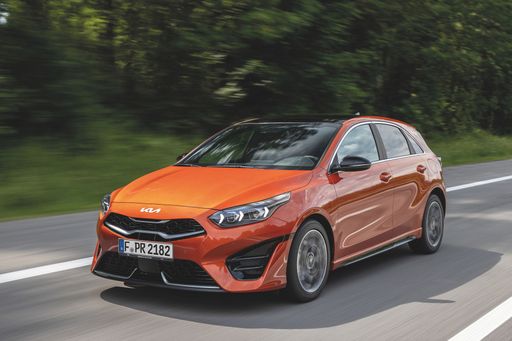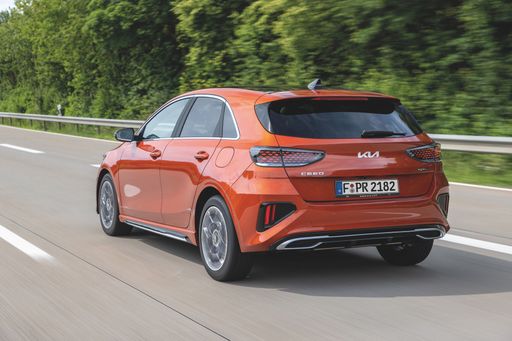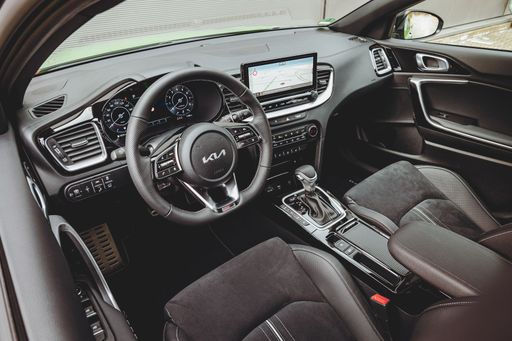VW Tiguan VS Kia Ceed – Specs, Efficiency & Price Comparison
Which model is the better choice – the VW Tiguan or the Kia Ceed? We compare performance (272 HP vs 140 HP), boot capacity (652 L vs 395 L), efficiency (0.40 L vs 6 L), and of course, the price (32800 £ vs 23100 £).
Find out now which car fits your needs better!
The VW Tiguan (SUV) is powered by a Petrol MHEV, Plugin Hybrid, Diesel or Petrol engine and comes with a Automatic transmission. In comparison, the Kia Ceed (Hatchback) features a Petrol MHEV or Petrol engine and a Automatic or Manuel gearbox.
When it comes to boot capacity, the VW Tiguan offers 652 L, while the Kia Ceed provides 395 L – depending on what matters most to you. If you’re looking for more power, you’ll need to decide whether the 272 HP of the VW Tiguan or the 140 HP of the Kia Ceed suits your needs better.
There are also differences in efficiency: 0.40 L vs 6 L. In terms of price, the VW Tiguan starts at 32800 £, while the Kia Ceed is available from 23100 £.
Compare all the key specs now and find out which model fits your lifestyle best!
VW Tiguan
The VW Tiguan presents itself as a versatile and practical option in the SUV market, combining a stylish design with a spacious and comfortable interior. It offers a smooth driving experience, making it well-suited for both urban environments and longer journeys. With its focus on safety and innovative technology features, the Tiguan remains a compelling choice for families and adventurers alike.
details @ Volkswagen
@ Volkswagen
 @ Volkswagen
@ Volkswagen
 @ Volkswagen
@ Volkswagen
 @ Volkswagen
@ Volkswagen
 @ Volkswagen
@ Volkswagen
 @ Volkswagen
@ Volkswagen
Kia Ceed
The Kia Ceed stands out in the compact car segment with its sleek design and impressive handling. It offers a comfortable and well-equipped interior that appeals to both drivers and passengers. With its efficient engine options, the Ceed provides a smooth and enjoyable driving experience suitable for city commutes and longer journeys alike.
details @ press.kia.com
@ press.kia.com
 @ press.kia.com
@ press.kia.com
 @ press.kia.com
@ press.kia.com

|

|
|
|
|
Costs and Consumption |
|
|---|---|
|
Price
32800 - 51000 £
|
Price
23100 - 31300 £
|
|
Consumption L/100km
0.4 - 8.5 L
|
Consumption L/100km
6 - 6.4 L
|
|
Consumption kWh/100km
-
|
Consumption kWh/100km
-
|
|
Electric Range
119 - 129 km
|
Electric Range
-
|
|
Battery Capacity
19.70 kWh
|
Battery Capacity
-
|
|
co2
8 - 193 g/km
|
co2
137 - 146 g/km
|
|
Fuel tank capacity
45 - 58 L
|
Fuel tank capacity
50 L
|
Dimensions and Body |
|
|---|---|
|
Body Type
SUV
|
Body Type
Hatchback
|
|
Seats
5
|
Seats
5
|
|
Doors
5
|
Doors
5
|
|
Curb weight
1599 - 1890 kg
|
Curb weight
1298 - 1390 kg
|
|
Trunk capacity
490 - 652 L
|
Trunk capacity
357 - 395 L
|
|
Length
4539 mm
|
Length
4315 - 4325 mm
|
|
Width
1842 - 1859 mm
|
Width
1800 mm
|
|
Height
1656 - 1658 mm
|
Height
1442 - 1447 mm
|
|
Payload
460 - 533 kg
|
Payload
470 - 500 kg
|
Engine and Performance |
|
|---|---|
|
Engine Type
Petrol MHEV, Plugin Hybrid, Diesel, Petrol
|
Engine Type
Petrol MHEV, Petrol
|
|
Transmission
Automatic
|
Transmission
Automatic, Manuel
|
|
Transmission Detail
Automat. Schaltgetriebe (Doppelkupplung)
|
Transmission Detail
Automat. Schaltgetriebe (Doppelkupplung), Schaltgetriebe
|
|
Drive Type
Front-Wheel Drive, All-Wheel Drive
|
Drive Type
Front-Wheel Drive
|
|
Power HP
130 - 272 HP
|
Power HP
100 - 140 HP
|
|
Acceleration 0-100km/h
5.9 - 10.6 s
|
Acceleration 0-100km/h
9.5 - 13.2 s
|
|
Max Speed
198 - 242 km/h
|
Max Speed
178 - 197 km/h
|
|
Torque
220 - 400 Nm
|
Torque
172 - 253 Nm
|
|
Number of Cylinders
4
|
Number of Cylinders
3 - 4
|
|
Power kW
96 - 200 kW
|
Power kW
74 - 103 kW
|
|
Engine capacity
1498 - 1984 cm3
|
Engine capacity
998 - 1482 cm3
|
General |
|
|---|---|
|
Model Year
2024
|
Model Year
2024
|
|
CO2 Efficiency Class
E, B, F, G
|
CO2 Efficiency Class
E
|
|
Brand
VW
|
Brand
Kia
|
VW Tiguan
Introducing the VW Tiguan: A Blend of Style and Innovation
The VW Tiguan has consistently been a popular choice among SUV enthusiasts, combining practicality with a touch of elegance. In the latest iteration, Volkswagen has continued this tradition with a range of technical updates and innovations.
Powertrains: Versatility Meets Efficiency
The VW Tiguan comes with a variety of engine options, catering to different preferences and needs. From the efficient petrol mild-hybrid variants to the environmentally friendly plug-in hybrids, and the robust diesel engines, there is something for everyone. The power output ranges from a modest 130 PS to an impressive 272 PS, ensuring that drivers can enjoy a powerful and dynamic driving experience.
Innovation remains at the heart of the Tiguan’s engineering. The plug-in hybrid models, for example, boast an electric range of up to 113 km, making them ideal for those looking to reduce their carbon footprint while still enjoying the flexibility of a traditional engine.
Advanced Transmission and Drivetrain
Equipped with a smooth and responsive automatic transmission, the Tiguan ensures a comfortable drive. The dual-clutch gearbox provides quick and seamless gear changes, enhancing the driving experience. Additionally, the Tiguan is available in both front-wheel and all-wheel drive configurations, offering excellent traction and stability across different driving conditions.
Performance and Efficiency
The Tiguan's performance capabilities are complemented by its efficiency. With fuel consumption as low as 0.4 L/100km for hybrid models, owners can enjoy long trips with fewer stops for refuelling. The CO2 emissions are also impressively low, aligning with modern environmental standards and expectations.
Design and Dimensions
The Tiguan’s aesthetic appeal is undeniable, with a robust character that exudes confidence and sophistication. Its dimensions—4,539mm in length, 1,842 to 1,859 mm in width, and up to 1,658mm in height—provide ample interior space, making it a versatile vehicle for families and adventure seekers alike.
Practicality is further emphasised by its sizeable boot space, ranging from 490 to 652 litres, ensuring plenty of room for luggage or shopping.
Safety and Technology
Volkswagen has not compromised on safety or technology. The Tiguan is equipped with the latest driver assistance systems, ensuring a safe journey for its occupants. Features like adaptive cruise control, lane assist, and emergency braking provide an extra layer of protection.
Pricing and Value
Starting from €38,250 to €59,535, the Tiguan offers a range of specifications and features to match different budgets. When considering the advanced technology, engine options, and the premium feel of the cabin, it presents excellent value for money.
Conclusion: The Ultimate SUV Experience
The VW Tiguan continues to impress with its blend of innovative technology, performance, and practicality. Whether you’re looking for an eco-friendly hybrid with a long electric range or a powerful diesel for longer hauls, the Tiguan provides an all-encompassing solution. With its refined design and superior comfort, it remains a leading choice in the SUV segment.
Kia Ceed
Discovering the Kia Ceed: A Symbol of Modernity
In the dynamic world of automotive engineering, Kia has consistently stood out with its innovative and reliable models. The Kia Ceed is no exception, bringing a blend of efficiency, style, and cutting-edge technology to the table. Let's delve into the details of this eye-catching hatchback and uncover what makes it an alluring choice for modern drivers.
Power and Performance: Under the Hood
The Kia Ceed is equipped with an impressive range of powertrains, offering a selection between petrol engines and mild-hybrid technology. The engine lineup boasts power outputs from 100 to 140 PS, catering to both economical driving needs and those seeking a bit more thrill on the road. The engine choices are complemented by either a smooth manual transmission or a state-of-the-art dual-clutch automatic, ensuring an engaging driving experience tailored to individual preferences.
Efficient and Eco-Friendly Engineering
Kia's dedication to eco-friendliness is evident in the Ceed's engineering, offering remarkable fuel efficiency between 6 to 6.4 L/100km. This focus not only keeps running costs low but also helps reduce emissions, maintaining a responsible footprint with CO2 emissions ranging from 137 to 146 g/km. This efficient performance ensures the Kia Ceed is both a financially savvy and environmentally considerate choice.
Advanced Technologies and Safety Features
Innovation is at the heart of the Kia Ceed's design, with a suite of advanced technological features enhancing comfort and safety. The latest driver-assist systems help keep occupants secure, providing confidence on every journey. Lane Keeping Assist, Forward Collision Warning, and Intelligent Speed Limit Assist are just some of the high-tech features that work seamlessly in the background, making driving both safer and more relaxed.
Styling and Comfort: A Perfect Cabin Space
Stepping into the Kia Ceed, drivers and passengers are greeted by a sophisticated interior, designed for comfort and style. Seen in multiple variants including the Nightline Edition and GT Line, the Ceed offers a premium feel across all its models. With dimensions that promise ample space—stretching up to 4325 mm in length and offering a boot capacity between 357 to 395 L—the Ceed perfectly accommodates both daily commutes and adventurous getaways.
Value for Money: A Wise Investment
Balancing a competitive initial outlay, ranging from €25,590 to €35,090, with low running costs, the Kia Ceed redefines value for money. This hatchback's adaptability to various lifestyle needs, paired with monthly costs from €887 to €1,019, positions it as a wise investment in the current automotive market.
Conclusion: The Kia Ceed in a Nutshell
The 2024 Kia Ceed superbly combines power, efficiency, and cutting-edge innovations, making it a noteworthy contender in the hatchback segment. Whether it’s the eco-friendly credentials, advanced safety systems, or the blend of practicality and style, the Kia Ceed is primed to lead the way in the evolving era of modern vehicles.
The prices and data displayed are estimates based on German list prices and may vary by country. This information is not legally binding.
